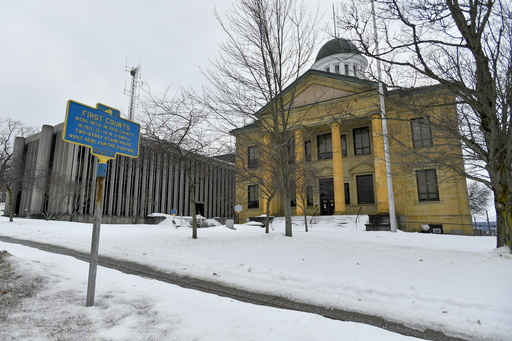
MAYVILLE, NY — In a shocking incident in 2022, author Salman Rushdie was preparing to give a lecture in western New York when he was violently attacked. A man charged at him and struck Rushdie’s hand with a knife as he attempted to defend himself. “After that, there were many blows to my neck, chest, and eye, everywhere,” Rushdie described in his memoir. He recounted the horrifying moment when he lost his strength and collapsed, succumbing to the brutal assault.
Soon, Rushdie is slated to return to the same area to serve as a witness in the trial of Hadi Matar, the individual charged with the attack. Jury selection commenced on Tuesday. Matar, a 27-year-old from Fairview, New Jersey, has entered a plea of not guilty to the charges of attempted murder and assault.
Had the circumstances been different, Rushdie’s memoir could have served as crucial evidence in the case regarding the August 12, 2022, assault, which resulted in the 77-year-old author losing vision in his right eye and sustain permanent injury to his hand. Chautauqua County District Attorney Jason Schmidt emphasized the visibility of the event, stating, “This isn’t an incident that happened unseen. It was recorded and witnessed by thousands.”
The jury is set to view video footage of the attack along with various photos and documentation, while approximately 15 witnesses are anticipated to testify during the trial. Judge David Foley indicated that once jury selection wraps up, the trial would likely last a week and a half.
The defense attorney for Matar, Nathaniel Barone, did not disclose details regarding his defense strategy. He responded firmly to those questioning Matar’s decision to reject a plea deal. “This case is about due process. It’s about ensuring a fair trial,” Barone asserted, highlighting the defendant’s rights in the judicial process.
In a related federal indictment, authorities suggest that Matar acted out of motivation from a terrorist organization, referring to a fatwa that called for Rushdie’s death. This will lead to a separate trial at the U.S. District Court in Buffalo to address charges related to terrorism, providing material support to terrorists, and attempting to support a terrorist group.
During jury selection, Judge Foley sought to determine whether potential jurors could remain impartial in a case involving a defendant of Muslim descent or those with strong religious beliefs. All potential jurors affirmed their ability to judge fairly. Nonetheless, it proved challenging to find jurors without preconceived notions about the case.
Out of the 27 individuals being screened, nearly all indicated awareness of the incident involving Rushdie, primarily through news outlets or personal connections. Many expressed that they had already formed unchangeable opinions surrounding the incident, complicating the selection process.
Last year, Matar’s legal team unsuccessfully sought to relocate the trial away from Chautauqua County due to concerns regarding extensive pretrial publicity and potential bias against individuals of Middle Eastern descent in the predominantly white rural community.
Rushdie, who faced years of hiding after the late Iranian leader Ayatollah Ruhollah Khomeini issued a fatwa in 1989 following the publication of “The Satanic Verses,” has been the subject of controversy for decades. The federal indictment claims that Matar believed the fatwa received support from Hezbollah, a militant group based in Lebanon and referenced in a 2006 speech by its past leader, Hassan Nasrallah.
Despite the background of the fatwa, Schmidt noted that jurors in the state case are not expected to hear details concerning the motive behind the attack. He maintained that the focus should remain on the local nature of the attack, which he deemed straightforward. “This is a stabbing event. I don’t see a need to delve into motive evidence,” he remarked, aiming to keep the trial focused.
However, Barone insisted that jurors should still be examined for any bias, given the past references to the fatwa during court proceedings. He suggested that discussions around the alleged motive have already colored the public’s perception.
Matar, born in the U.S. but holding dual citizenship in Lebanon where his parents originated, has been held without bail following his arrest when bystanders subdued him after the attack. Rushdie, originally from India and a citizen of the United States since 2016, continues to navigate the aftermath of that traumatic day. The event’s moderator, Henry Reese, co-founder of City of Asylum in Pittsburgh, also sustained injuries during the incident.

